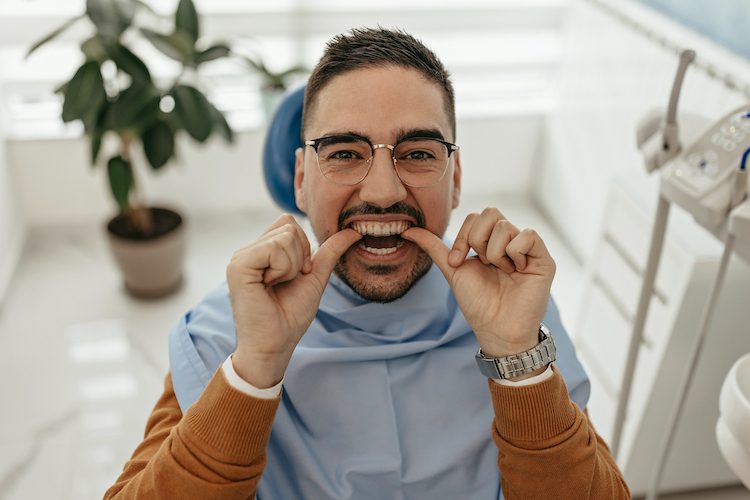Invisalign has transformed smiles for millions of people. The clear aligners often provide an effective alternative to traditional braces. They offer a discreet way to straighten teeth without metal brackets. Proper care after treatment better ensures your teeth remain straight and healthy.
Wear Your Retainer Consistently
Retainers play a crucial role in maintaining your new smile. Teeth can shift back to their original positions without proper retention. It is essential to follow your dentist’s instructions for retainer wear. Initially, you may need to wear your retainer full-time. Eventually, you might only need it at night. Consistent use prevents unwanted movement and keeps your teeth aligned. Skipping even a few nights can cause noticeable shifts.
Keep your retainer clean to avoid bacteria buildup. A dirty retainer can lead to oral health issues. Use a soft-bristled toothbrush and mild soap for cleaning. Avoid using toothpaste, which can scratch the surface of the retainer. Toothpaste contains abrasive particles that can damage the material. Store your retainer in its case when not in use. This prevents damage or loss, which can be costly to replace. Always rinse your retainer with water before wearing it again.
Maintain a Good Oral Hygiene Routine
Good oral hygiene remains essential after Invisalign treatment. Brushing your teeth at least twice daily is crucial. Use fluoride toothpaste to help strengthen your enamel. Fluoride helps protect against cavities and decay. Floss daily to remove plaque and food particles between teeth. Consider using an interdental brush for tight spaces. These brushes can reach areas that regular floss might miss.
Rinse with an antiseptic mouthwash to kill bacteria. Mouthwash can help freshen breath and reduce plaque buildup. Regular dental check-ups help monitor your oral health. Your dentist can spot potential issues early, preventing more significant problems. Professional cleanings remove plaque and tartar buildup. These cleanings also polish your teeth, keeping them bright and healthy.
Watch Your Diet
Your diet significantly impacts your oral health. Limit sugary and acidic foods and drinks. These substances can erode enamel and cause cavities. Acidic foods and drinks can also lead to tooth sensitivity. Drink water to rinse away food particles and neutralize acids. Chew sugar-free gum to increase saliva production. Saliva helps neutralize acids and wash away food particles.
Choose healthy snacks like fruits and vegetables. These foods provide essential nutrients for strong teeth and gums. Crunchy fruits and vegetables can also help clean your teeth. Consider incorporating dairy products, which are rich in calcium. Calcium strengthens teeth and bones, promoting oral health.
Address Grinding and Clenching
Bruxism, or teeth grinding, can damage your smile. Many people grind their teeth unknowingly, especially at night. Stress often contributes to this habit, exacerbating the issue. A custom night guard could protect your teeth from grinding damage. Your dentist can create one to fit your mouth comfortably. Wearing a night guard can help prevent wear and tear on your teeth.
Monitor for Any Changes
Stay vigilant for any changes in your smile. Shifting teeth or discomfort may indicate a problem. Contact your dentist if you notice any issues. Early intervention could prevent more significant problems from developing. Regular dental visits help catch potential issues early. Keep your dentist informed about any changes in your oral health. They can provide guidance and solutions for maintaining your smile.
Pay attention to any changes in bite or alignment. These can signal issues that need addressing. Report any pain or discomfort to your dentist immediately. Quick action often prevents further complications. Regular check-ups ensure your dental health remains optimal. Your dentist can adjust your retainer or provide additional treatments if necessary.
Invisalign FAQs
How often should I come in for check-ups after Invisalign treatment?
Most patients see their dentist or orthodontist every 6 months after finishing Invisalign, unless more frequent monitoring is needed. These visits help ensure your teeth stay in place and your retainer fits properly. If anything feels off, schedule an appointment sooner.
How long do I need to wear my Invisalign retainer each day?
After treatment, you’ll need to wear your retainer full-time—usually around 20 to 22 hours a day—for several months. After that, you can typically switch to nighttime wear only. Your dentist will give you a schedule based on how your teeth respond.
Can a night guard be worn with a retainer if I grind my teeth?
You usually can’t wear both at the same time, but we can make a custom night guard that also works as a retainer. It’s designed to protect your teeth from grinding while keeping them aligned. Never try to combine devices without your dentist’s guidance.
What are the signs that my teeth might be shifting out of place again?
If your retainer feels tight, doesn’t fit, or you notice small gaps or crowding, your teeth may shift. Other signs include changes in your bite or discomfort when chewing. If you notice any of these, contact your dentist right away.
Can I whiten my teeth after finishing Invisalign?
Yes, you can whiten your teeth once you finish Invisalign treatment. In fact, your aligner trays may even be used for whitening if your dentist provides gel. Just make sure your teeth and gums are healthy before starting any whitening treatment.
Is there a difference between Invisalign and traditional retainers?
Yes, Invisalign trays are aligners used to move teeth, while retainers are used to hold them in place. Traditional retainers, like Hawley or Essix types, are made for long-term use after treatment. They’re designed to maintain your results, not shift your teeth.
Can I switch from a removable retainer to a permanent one?
Yes, in many cases, you can switch to a permanent (fixed) retainer, especially if you want a lower-maintenance option. Your dentist will check your bite and gum health to ensure a fixed retainer is a good fit. Not everyone is a candidate, so it depends on your specific case.
Invisalign Treatment in Denton, TX
At Stone Creek Dental, we are here to help with all your dental needs. We provide comprehensive care for a healthy, beautiful smile. If you suffer from crooked teeth or malocclusion, Invisalign could help. Contact us today to schedule a consultation and learn more about your cosmetic treatment options.

